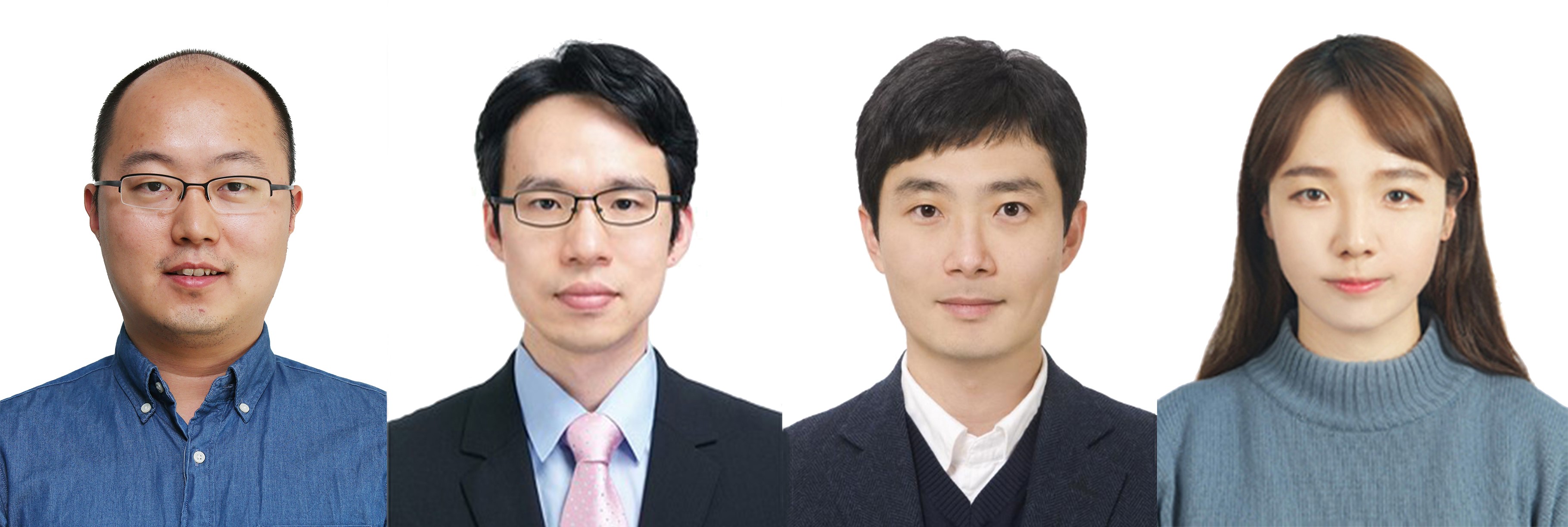people

< (From left) Professor YongKeun Park, Professor Jonghwa Shin, Professor Hongki Yoo, and Dr. Sejeong Kim >
Four KAISTians were selected as star researchers to brighten the future of optics in commemoration of the 30th anniversary of the Optical Society of Korea (OSK). As ‘OSK Rising Stars 30’, the OSK named 27 domestic researchers under the age of 40 who have made significant contributions and will continue contributing to the development of Korea’s optics academia and industry.
Professor YongKeun Park from the Department of Physics was selected in recognition of his contributions to the field of biomedical optics. Professor Park focuses on developing novel optical methods for understanding, diagnosing, and treating human diseases, based on light scattering, light manipulation, and interferometry. As a member of numerous international optics societies including the OSA and the SPIE and a co-founder of two start-up companies, Professor Park continues to broaden his boundaries as a leading opticist and entrepreneur.
Professor Jonghwa Shin from the Department of Materials Science and Engineering was recognized for blazing a trail in the field of broadband metamaterials. Professor Shin’s research on the broadband enhancement of the electric permittivity and refractive index of metamaterials has great potential in both academia and industry.
Professor Hongki Yoo from the Department of Mechanical Engineering is expected to create a significant ripple effect in the diagnosis of cardiovascular disorders through the development of new optical imaging techniques and applications.
Finally, Dr. Sejeong Kim, a KAIST graduate and a Chancellor’s postdoctoral research fellow at the University of Technology Sydney (UTS), was acknowledged for her optical device research utilizing two-dimensional materials. Dr. Kim’s research at UTS now focuses on the introduction of micro/nano cavities for new materials.
(END)
-
people Professor Jungwon Kim Wins Haerim Optics and Photonics Award
(Professor Jungwon Kim) Professor Jungwon Kim from the Department of Mechanical Engineering received the 8th Haerim Optics and Photonics Award from the Optical Society of Korea (OSK). He was recognized for his dedication to pioneering the field of microwave photonics by developing ultra-low noise fiber photonics lasers. The Haerim Optics and Photonics Award is given to an outstanding researcher who has made academic contributions in the field of optics and photonics for the last fiv
2018-02-07 -
people Dr. Se-Jung Kim Receives the Grand Prize at the International Photo and Image Contest on Light
Dr. Se-Jung Kim of the Physics Department at KAIST received the Grand Prize at the 2015 Photo and Image Contest of the International Year of Light and Light-based Technologies. The United Nations has designated the year 2015 as the International Year of Light and Light-based Technologies. The Optical Society of Korea celebrated the UN’s designation by hosting an international photo and image contest on the theme of light and optics related technology. Dr. Kim presented a photo of imag
2015-07-31 -
people The First Winner of Sang Soo Lee Award in Optics and Photonics
The Optical Society of Korea and the Optical Society of America selected Mario Garavaglia, a researcher at the La Plata Optical Research Center in Argentina, as the first winner of the Sang Soo Lee Award. Dr. Garavaglia has been selected to receive the award in recognition for his research and education in the field of optics and photonics in Argentina. The Sang Soo Lee Award, co-established by the Optical Society of Korea and the Optical Society of America in 2012, is awarded to an indi
2014-03-31 -
people Seo-Eun Lee, an undergaruate student receives the Best Paper Award from Optical Society of Korea
Seo-Eun Lee, a student studying at KAIST’s Department of Biological Sciences, has won the Best Paper Award from Bio-Photonics Division at the 2014 Optical Society of Korea Winter Conference, held on 19th February at Daejeon Convention Center. Only one outstanding paper per division is given an award among the total of 270 papers, and it is very unusual for an undergraduate student to win the award in the field that is not her major. Lee has studied cell imaging using holography tec
2014-03-06